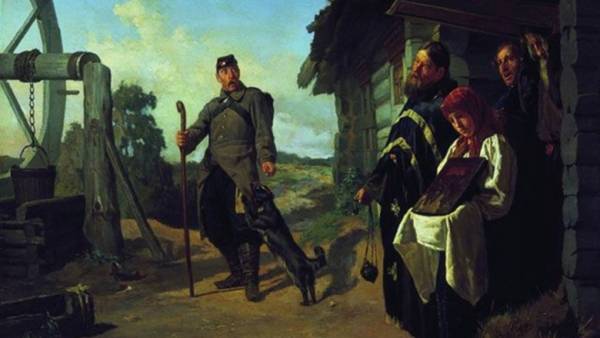DMB royally. In Russia introduced universal conscription
The press claimed that the military reform of Alexander II is perceived by the population as a whole, positive, and universal military service, unlike conscription, elicits a burst of enthusiasm. In fact, the appeal was dissatisfied with every second.

145 years ago, on 13 January 1874 on paper laid down signed reigning monarch, Emperor Alexander II. The signature expected by many people, but a greater number of people it seemed like thunder from a clear sky. A Regal hand was approved the Charter of the universal all-classes military service.
That day is the official starting point of all that is so familiar to our current countrymen. The age of conscription, medical examination, benefits, deferred for family reasons, deferment of study, dodging, and finally, the longed-for many, the release of the call.
The latter may serve as a signal to attack. Say lies all in the new army went willingly, because compared to the old it has become much better and more humane.
At first glance the way it is. Conscription has replaced the conscription system of the army. But conscription, as it is known in many literary works, was one of the most terrible calamities for the common people. The one who is “zabrivali forehead” and sent to soldiers, all others were revered almost dead. Service life — 25 years. Will return or not is unknown. Rather, not back, because the formula: “Here’s three men, make me one of them a soldier,” was more or less known to all. As well as the fact that “dressing the soldier” was widely used rods, that is, the punishment sticks. Be traced to the death 60 people out of a hundred was considered to be in the order of things. Throw in another continuous war, where losses were considered small, and the diseases and epidemics. There were, however, conscription is almost the only plus. She was one of the few social elevators of the Russian Empire, which allowed him to escape from bondage. The soldiers had lost touch with the old estate and moved into the class of military. A certain portion of luck and strong health was to resign personally a free man with the right of land ownership. Of lucky for the first 50 years of the nineteenth century could count just under a million.
Conscription changed everything.
First, it is now subject to appeal all classes that were perceived by those same farmers as a measure more or less fair. Secondly, the period of active service was reduced from 25 years to 6 years in the army and 7 years in the Navy. Thirdly, the army has indeed become more humane — even in 1863, there was officially abolished corporal punishment as a form of responsibility for misconduct.
In those times, individual members of the press, too, could indicate that it is necessary and what not to write. Well, if you combine the authoritative instruction with small recompense, you will do well. For example, in one of the provincial newspaper covering the first call: “Before I enter into the presence (office, office — approx. ed.) recruit, he trembles and turns pale. Behind him comes old father or old mother and now falls to the audience on his knees: “our Fathers out! His kids are little!” Now the rookie walks fast, fun, looks, as they say, a Falcon. For him questions of his elders to beg for mercy from the presence… “be Baptized, pray to God, serve faithfully!”, says our venerable, respected President.”
Overall, the picture of goodness. But there are a few things that could seriously damage this foil clearly biased illustration. First of all, no “universal” that call was not. Then, as now, was dominated by sung by George Orwell’s principle: “All are equal but some are more equal than others”. So, according to the “Statute” exemption from the draft were: “non-Russian native inhabitants of Central Asia, Kazakhstan, and some districts of Siberia, Astrakhan, Turgai, Ural, Akmola, Semipalatinsk, Semirechensk, and Transcaspian areas of the Arkhangelsk province”.